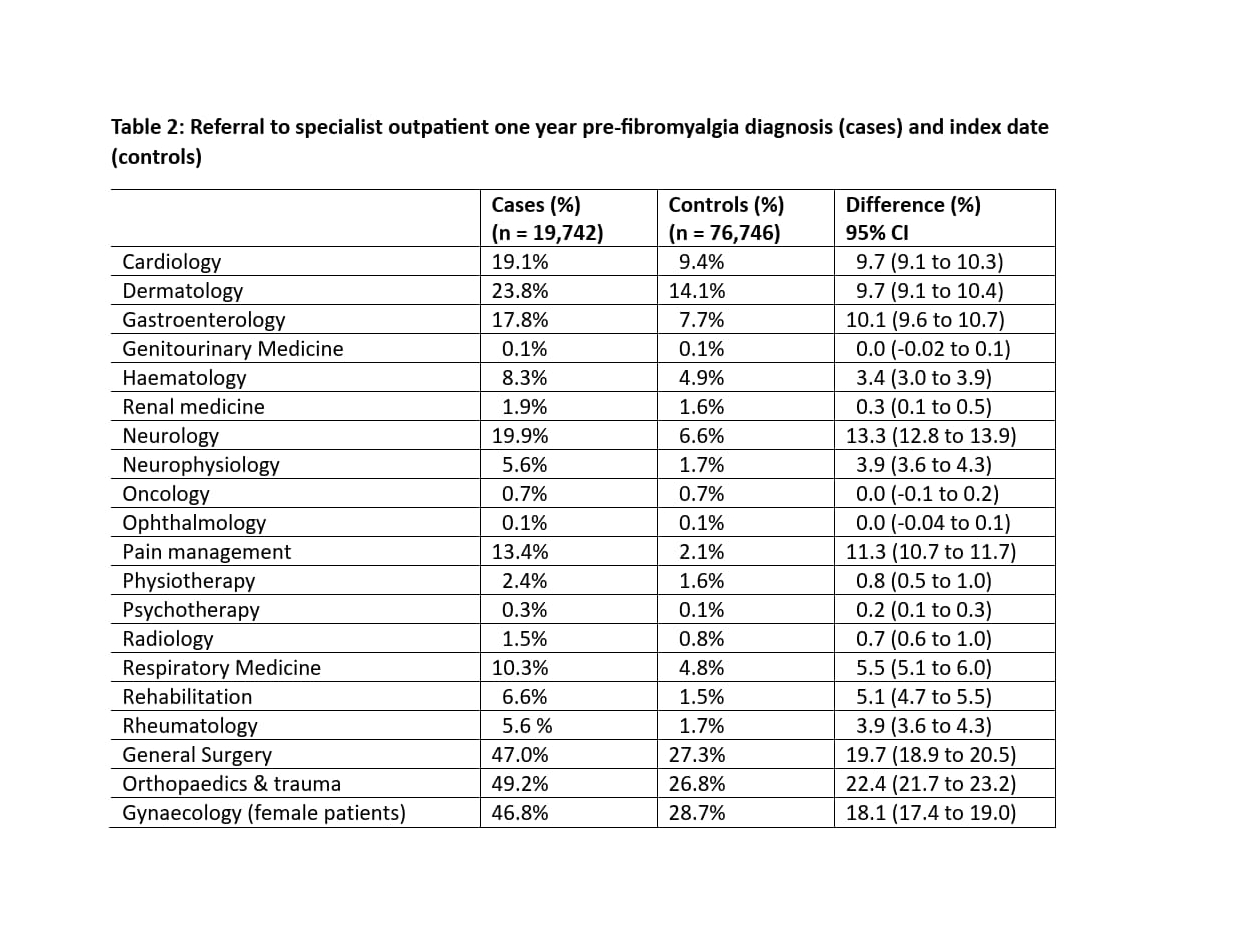Session Information
Session Type: Poster Session C
Session Time: 9:00AM-11:00AM
Background/Purpose: A large body of evidence has informed, internationally, management recommendations for people with fibromyalgia. However there are very few studies which have examined how best to design services to deliver effective care. Much of the available evidence characterising the health and use of health services for people with fibromyalgia comes from small studies or in highly-selected groups. The use of routinely collected health data offers the possibility of large and unselected samples to better quantify the characteristics of people with fibromyalgia and their use of health services.
Methods: A case-control study of patients with fibromyalgia using deidentified National Health Service health and care data held in the Secured Anonymised Information Linkage (SAIL) databank for the whole population of Wales. Individuals ≥18 years and with a code present for fibromyalgia in their primary care records between 2004-18 formed the case group. Each case was matched with up to four controls: by sex, age; socio-economic status and with a code for any health care use within 30 days of the code date of the case. We analysed past events in their primary care record for cases and controls.
Results: 19,742 cases and 76,746 controls were included in this analysis. The vast majority of cases were female (89%) and had a median age of 48 years. The mean BMI was higher in cases (30.3 v. 28.8 kgm-2) who were also more likely to have smoked (73 v. 68%), and have comorbidities (with the exception of cancer) (Table 1), specifically Inflammatory Arthritis (5.4 v. 2.2%) and Inflammatory Bowel Disease (1.9 v. 1.1%) . Depression/anxiety was recorded in 74% of cases, while sleep disorders were also common (24.8%). The use of anti-depressants was near universal in people with fibromyalgia (95%), opiates prescription common (82%), while gabapentin was used by 51% and steroids by 44%. Codes for tress and bereavement (27.2 v. 17.6%) and specifically adverse life events (10.7% v. 8.8%) were significantly more common in cases. In the year prior to diagnosis referrals to 17 out of the 20 specialties examined were more common in cases – particularly for Gastroenterology, Neurology, Pain Management, General Surgery and Orthopaedics (Table 2). Only 1 in 20 of cases have been referred to Rheumatology prior to the first recording of fibromyalgia in their records, however almost half had been referred to each of General Surgery, Orthopaedics and Gynaecology.
Conclusion: This whole population approach has quantified the burden of comorbidities in people diagnosed with fibromyalgia, and highlighted the very common use of opiates whose use is recommended against. The previously reported role of adversity in the aetiology of the condition is replicated. This large unselected-sample approach offers potential for understanding interactions with healthcare of people before and after diagnosis of fibromyalgia (and relating to these to patient characteristics); investigating the opportunities for harm; and the design of more efficient and effective approaches to their care.
To cite this abstract in AMA style:
Macfarlane G, Cooksey R, Choy E, Hollick R. Using a Whole-population Approach to Help Design More Effective and Efficient Healthcare Services for People with Fibromyalgia [abstract]. Arthritis Rheumatol. 2023; 75 (suppl 9). https://acrabstracts.org/abstract/using-a-whole-population-approach-to-help-design-more-effective-and-efficient-healthcare-services-for-people-with-fibromyalgia/. Accessed .« Back to ACR Convergence 2023
ACR Meeting Abstracts - https://acrabstracts.org/abstract/using-a-whole-population-approach-to-help-design-more-effective-and-efficient-healthcare-services-for-people-with-fibromyalgia/


